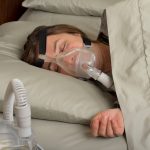Sleep apnea sufferers may someday be able to trade in their “Darth Vader” breathing mask for a daily pill.
For years, sleep apnea patients have dealt with the clunky large Continuous Positive Airway Pressure (CPAP) machine to sleep at night.
Or they had to consider surgery or other physical devices to help with breathing.
But there’s new hope that a drug could be used to treat the disease.
This month, scientists announced that synthetic cannabis has been shown to help treat sleep apnea symptoms in some patients.
Researchers from Northwestern Medicine and the University of Illinois at Chicago say they found evidence that a type of synthetized version of THC (a compound found in cannabis) was effective at treating some sleep apnea.
The participants were randomly put into three groups: One group received 2.5 milligrams per day of the drug called dronabinol. Another group got 10 milligrams daily. A third was given a placebo.
Dronabinol has already been approved by the Food and Drug Administration (FDA) for treating nausea and vomiting in cancer patients.
In this study, patients who had 10 milligrams of dronabinol per day before bed reported fewer symptoms than the placebo group.
Those results included less shallow breathing episodes (called hypopneas), less sleepiness, and overall better “satisfaction” with treatment compared to the placebo.
Overall, those taking the 10 milligrams dose reported a 33 percent reduction in the severity of their disorder.
Sleep apnea is a disorder defined as one in which you experience one or more pauses in your breathing or shallow breathing during sleep.
It can be caused by physical malformations, like enlarged tonsils, or by narrowing or “floppy” (collapsing) airways, any of which can obstruct breathing.
In rare cases it can be caused by the brain not sending the correct signals to the muscles that keep you breathing.
Shallow breathing or pauses in breathing can reduce the amount of oxygen people take in, which can be harmful to their overall health. It’s associated with increased risk of cardiovascular disease, stroke, and heart attack.
These pauses or disruptions in breathing can also jolt the body partially into wakefulness, which can keep a sleeper from reaching the restorative REM levels of sleep.
Dr. Phyllis Zee, a professor of neurology at Northwestern University Feinberg School of Medicine, director of the Northwestern Medicine Sleep Disorders Center, and co-author of the study, said that the drugs work differently than the CPAP machines that continuously deliver air to people while sleeping.
“The CPAP device targets the physical problem but not the cause,” Zee said in a statement. “The drug targets the brain and nerves that regulate the upper airway muscles. It alters the neurotransmitters from the brain that communicate with the muscles. Better understanding of this will help us develop more effective and personalized treatments for sleep apnea.”
More research on the drug is needed to confirm the research findings.
Dr. Kingman Strohl, the program director of Sleep Medicine at the University Hospitals Cleveland Medical Center, said these drugs could dramatically change the way doctors treat sleep apnea patients.
“Drugs would be the next frontier,” he told Healthline. “It would be the game changer.”
He explained that, in theory, the drug would work by fighting the “reduction in drive to respiratory muscles” and by helping to keep the airway open.
Strohl explained that doctors had been searching for decades for an effective drug treatment, but that it was difficult to find a way to stimulate the muscles that help with respiration without waking up patients.
“The drug itself has to allow you to sleep,” he said. “In the late ’80s we showed that nicotine helps sleep apnea, but the problem is that nicotine also wakes you up.”
Dr. Jordan S. Josephson, a snoring and sleep apnea specialist at Lenox Hill Hospital in New York, said he thought attitudes toward sleep apnea have been changing and more people are seeking treatment.
“I think people are more aware of sleep apnea,” he said. “We always used to laugh at snoring.”
The potential new drug could be helpful as another option for doctors since some patients have a difficult time using CPAP machines.
One study found just 54 percent of patients used the machines after their sleep apnea diagnosis.
Other options like physical devices that keep the airway open and surgery, also come with their own complications.
“It’s one more tool in the armamentarium,” said Josephson, who is also the author of the book “Sinus Relief Now.”
Josephson said that sleep apnea can take a serious toll on the cardiovascular system as the body grapples with lowered oxygen levels at night and interrupted sleep.
“Certainly, if we can reduce that with a drug or medicine and in this case cannabinoid-like or marijuana-like product, then that would be great for people,” he said.
(1411)





Leave A Reply